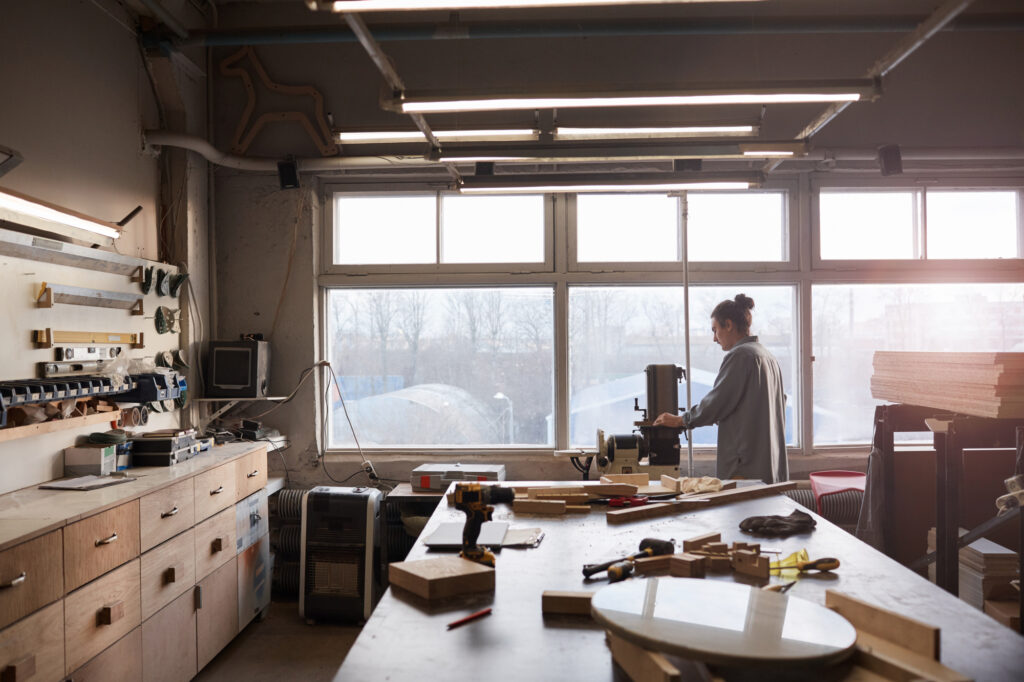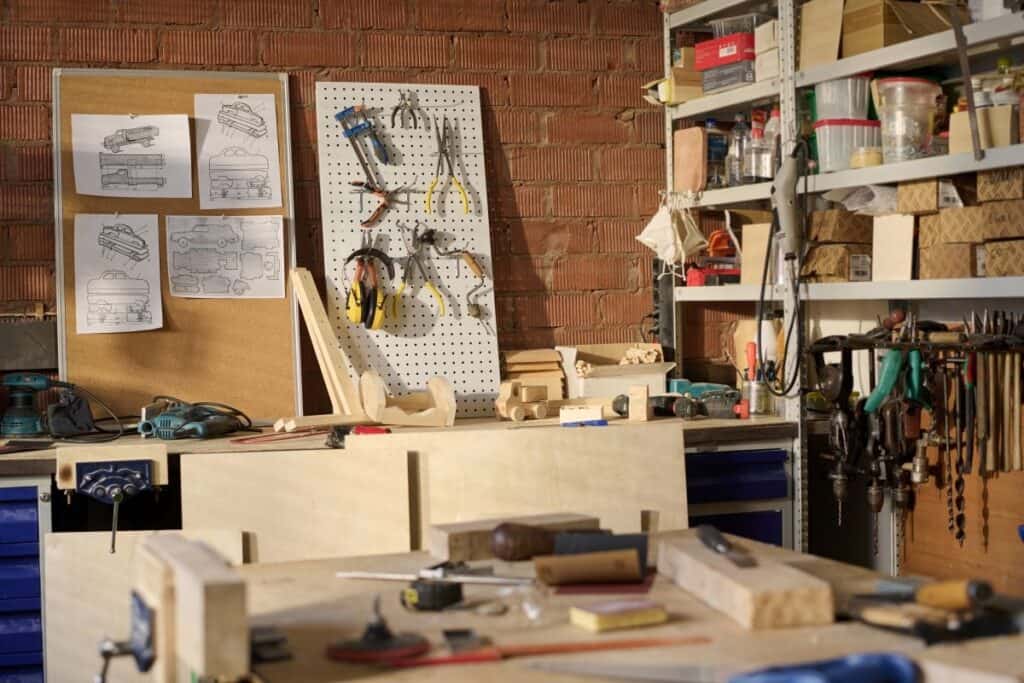Introduction to Workshop Log Cabins
Workshop log cabins have gained significant popularity over the years, offering a versatile solution for various needs. Whether utilized as a workspace, storage unit, or hobby room, these cabins provide an attractive yet functional addition to residential properties. This article explores the various aspects of workshop log cabins, including their sizes, roof types, customization options, and the benefits they offer.
Definition and Purpose of Workshop Log Cabins
A workshop log cabin is a small structure made primarily from logs, designed to serve as a functional space for various activities. These cabins can function as workshops for woodworking, crafting, or mechanical work, providing a dedicated area away from the distractions of home. The natural aesthetic of log cabins enhances outdoor spaces, offering a rustic charm that can complement any garden or backyard.
The purpose of these cabins extends beyond mere storage; they can serve as creative spaces, retreats, or even guest accommodations. By creating a distinct area for hobbies or work, individuals can maintain better focus and organization, fostering productivity and creativity in their pursuits.
Importance of Choosing the Right Size
Choosing the right size for a workshop log cabin is crucial as it impacts functionality, comfort, and the cabin’s overall aesthetic. The size should be determined based on the intended use, available space in the yard, and personal preferences. A well-sized cabin can provide ample room for tools, equipment, and workspace, while a cramped design may lead to frustration and inefficiency.
Moreover, the dimensions of the cabin can also affect installation costs, maintenance, and zoning regulations in different areas. Thus, investing time in determining the appropriate size can lead to long-term satisfaction and functionality.
Standard Sizes of Workshop Log Cabins
3x3m Workshop Log Cabins
The 3x3m workshop log cabin is ideal for smaller spaces and serves well as a compact workspace. This size is particularly suitable for individuals with minimal equipment or those who engage in light hobbies, such as painting or crafting. Despite its small footprint, a 3x3m cabin can still be designed to maximize storage, making it an efficient choice for limited yards.
Additionally, the 3x3m model often comes with various customization opportunities, including shelving units and workbenches. These features can transform a simple structure into a functional workshop without overwhelming the available space.
3.5×3.5m Workshop Log Cabins
The 3.5×3.5m workshop log cabin offers a bit more room, making it a versatile option for various activities. This size provides enough space for additional tools and equipment, making it suitable for more extensive projects or hobbies. The slightly larger dimensions also contribute to better airflow and natural light, which can enhance the overall experience when working inside.
This size can comfortably accommodate workstations, storage solutions, and even a small seating area. As a result, it is an attractive option for those who want a functional yet pleasant environment in which to work or create.
4x4m Workshop Log Cabins
The 4x4m workshop log cabin represents a more spacious alternative, ideal for serious hobbyists or professionals needing substantial workspace. This size allows for multiple workstations, significant storage space for tools, and room for moving around comfortably while working on various projects.
With the added space, users can also consider incorporating larger equipment or machinery, such as a woodworking lathe or a potter’s wheel. The 4x4m cabins can seamlessly adapt to specific needs, making them a worthwhile investment for anyone looking for a dedicated workspace.
Roof Types for Workshop Log Cabins
Pent Roof Design
The pent roof design features a single slope, allowing for efficient water runoff and a modern aesthetic. This type of roof is straightforward to construct and can be an economical choice for those looking to save on building costs. The pent roof also allows for slightly increased interior height, which can be beneficial for taller workspaces or for accommodating shelving units.
Pent roofs are often favored for their contemporary appearance, fitting seamlessly into various environments while still retaining the classic log cabin charm. They can also be easily integrated with solar panels, making them a sustainable choice for environmentally conscious builders.
Chalet Roof Design
The chalet roof design is characterized by its sloped sides and raised peak, providing a traditional, rustic appearance. This design enhances the aesthetic appeal of the cabin while offering increased headroom and potential loft storage space. The slope of the chalet roof allows for effective drainage and snow shedding, making this option suitable for areas with heavy snowfall.
Additionally, the chalet roof allows for larger windows to be incorporated, enhancing natural light and ventilation. This is particularly beneficial for workshops where visibility is essential for detailed work.
Apex Roof Design
The apex roof design features two sloping sides that converge at the peak, creating a triangular shape. This style is not only visually appealing but also maximizes interior space. The apex roof provides excellent structural integrity, making it suitable for various weather conditions. Its design facilitates water runoff, reducing maintenance issues associated with stagnant water.
This roof type allows for plenty of natural light through the use of skylights or larger windows, contributing to a bright and inviting workspace. It is an excellent choice for those who prioritize aesthetics alongside functionality.
Customization Options for Workshop Log Cabins
Adjusting Cabin Size According to Customer Needs
One of the significant advantages of workshop log cabins is the ability to customize their size according to individual requirements. Building companies offer various dimensions, allowing customers to select the ideal size based on personal preferences, available land, and intended use. This aspect of customization ensures that each cabin perfectly fits the user’s needs, whether for light crafting or heavy-duty woodworking.
Additionally, customers can opt for modular designs that allow for future expansion if their needs change. This flexibility can make a workshop log cabin a long-term investment, accommodating the evolving needs of its owner.
Incorporating Additional Windows
Incorporating additional windows into the design of a workshop log cabin is another popular customization option. Increased natural light can significantly enhance the work environment, reducing reliance on artificial lighting and creating a more pleasant atmosphere. Windows can be strategically placed to maximize light without compromising privacy.
Furthermore, additional windows can improve ventilation, helping to keep the interior comfortable during warmer months. This consideration is particularly important for workshops where fumes from tools or materials may accumulate. The right balance of light and air can create a more conducive working space.
Adding Extra Doors for Accessibility
For workshop log cabins utilized for more extensive projects, adding extra doors can significantly improve accessibility. This customization allows for easier movement of larger tools, materials, and completed projects in and out of the cabin. Having multiple entry points can also enhance the workflow, allowing users to arrange their workspace efficiently.
Extra doors can also be designed to meet specific needs, such as wide openings for large machinery or double doors for heavy equipment. This level of accessibility can make a significant difference in productivity and overall satisfaction with the workspace.
Benefits of Choosing Workshop Log Cabins

Durability and Longevity
Workshop log cabins are renowned for their durability and longevity, primarily due to the materials used in their construction. Log cabins, when built correctly, can withstand various weather conditions, including heavy rain, snow, and strong winds. The natural insulating properties of wood also help regulate temperature, ensuring a comfortable working environment year-round.
Investing in a workshop log cabin can provide peace of mind, knowing that it can serve its purpose effectively for many years. Regular maintenance, such as treating the wood and checking for rot or damage, can further extend the lifespan of the cabin, making it a worthwhile investment.
Environmental Benefits
Choosing a workshop log cabin can yield several environmental benefits, particularly when sustainable materials are used. Wood is a renewable resource, and when sourced responsibly, it can minimize the carbon footprint associated with construction. Log cabins also blend seamlessly into natural surroundings, enhancing the aesthetic appeal of outdoor spaces without disrupting local ecosystems.
Additionally, the insulation provided by log cabins can lead to reduced energy consumption for heating and cooling, showcasing a commitment to environmentally friendly practices. For those concerned about sustainability, workshop log cabins offer an attractive solution.
Cost-Effectiveness
Workshop log cabins often present a cost-effective solution for creating functional spaces without the need for extensive renovations or new builds. The straightforward construction process can lead to reduced labor costs, and the longevity of the materials used can result in lower maintenance costs over time.
Moreover, the versatility of cabin use means that homeowners can adapt the space for various purposes, potentially leading to increased property value. Whether used for a workshop, garden shed, or guest accommodation, the adaptability of log cabins makes them a wise financial choice.
Conclusion
Summary of Key Features
Workshop log cabins serve as functional, aesthetically pleasing structures that can cater to a range of needs. With various standard sizes, roof designs, and customization options, these cabins can be tailored to fit individual preferences and operational requirements. Their durability, environmental benefits, and cost-effectiveness make them a wise investment for anyone looking to enhance their property.
Encouragement for Potential Buyers
As you consider the options available for workshop log cabins, remember the long-term benefits of investing in a quality structure that meets your specific needs. The ability to customize size, design, and functionality ensures that you can create a workspace conducive to creativity and productivity. Explore the variety of designs and features available, and discover how a workshop log cabin can transform your work and hobby experiences.
FAQs
What are the main purposes of a workshop log cabin?
A workshop log cabin can serve various purposes, including as a dedicated workspace for hobbies, a storage area for tools and materials, or even as a guest accommodation space. Its versatility makes it a valuable addition to any property.
How long does a workshop log cabin typically last?
When built and maintained correctly, a workshop log cabin can last for several decades. The longevity largely depends on the quality of materials used and regular maintenance practices.
Can I customize the size of my workshop log cabin?
Yes, many manufacturers offer customization options that allow you to adjust the size of your workshop log cabin according to your specific needs and available space.
What are the best roof types for a workshop log cabin?
The best roof type for a workshop log cabin depends on personal preference and local weather conditions. Popular options include pent roofs for modern aesthetics, chalet roofs for traditional designs, and apex roofs for maximizing interior space.
Are workshop log cabins environmentally friendly?
Yes, workshop log cabins can be environmentally friendly, especially when constructed from sustainably sourced wood. Their natural insulation properties help reduce energy consumption, making them a sustainable choice for eco-conscious consumers.

